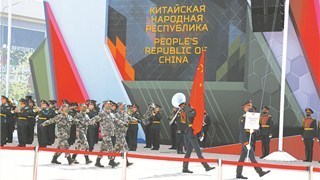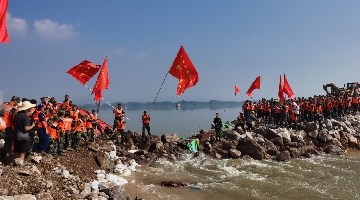The US State Department spokesperson Ned Price said on Wednesday that US Deputy Secretary of State Wendy Sherman would seek to show China on hisupcoming visit to Beijing what responsible and healthy competition can look like, and the United States wanted to ensure there were “guardrails” in the relationship and that competition did not spill over into conflict.
Literally, what Price said seemed perfectly fine. China doesn’t wish to see its competition with the US escalate into conflict either, and commonly established “guardrails” by the two countries to forestall the escalation, which has caused general concern, would be good news for both and the world at large.
Yet we’ve learned from experience that it’s like Washington to say one thing and do another and gloss over its bullying behaviors with resounding concepts, whose connotations it has bent and distorted. For example, Washington has made “rules” its catchword, but the world has seen only too clearly how it has most grossly trampled upon the basic principles governing international relations that were based on the UN Charter. The rules it has been babbling about refer to those protecting the interests of the US and its main allies, and they are only applied to force other countries to maintain those interests to the largest extent.
To set up “guardrails” in China-US competition, both sides need to observe the principle of equality and mutual benefits and answer to the spirit of the UN Charter. There is no way we would allow Washington to unilaterally mark the boundary for China to realize its own interests and keep prodding China’s core interests. In that case, the “guardrails” only serve America’s interests but are limiting barbwires for China. Truly neutral and equal guardrails to keep the China-US competition escalating into conflict must meet the following standards.
First, the US should not interfere in China’s internal affairs, must give up its obsession with “reforming China”, and must stop being narcissistic about its aggressive values. Respecting each other and not posing one’s nose into each other’s internal affairs is the fundamental principle on which a security wall can be built between two major countries.
Second, US troops should not press down on China’s core interests and should clear away at a reasonable distance. Especially in the Taiwan Strait, the US should not serve as the military backing for “Taiwan independence” forces or encourage them to make waves – that would be very dangerous. The US should not get directly involved in any dispute or conflict in the South China Sea. Any of its attempts to navigate the South China Sea situation through military pressuring would mean a high risk of armed conflicts.
Third, the US should not turn its competition with China into aggressive squeezing of China’s development. Its plot to rally with its allies to exclude China from the main global supply chains, if going any further, will eventually lead to a fundamental conflict with the country, which will cause such wide-ranging consequences and add so much instability and long-term uncertainty to the international landscape that the two countries will end up in cut-throat competition as strategic enemies.
All in all, the US should not try to attack China’s system, or split China, or block its way of development – these are the preconditions for building the “guardrails”. If Washington breaks any of the three conditions, it would be taking the initiative to attack China, and that is no competition. In that case, China will fight back, hard, at all costs.
The US should be honest with itself and stop self-deception. If with Washington’s support or instigation, the Taiwan authorities crossed the red line and claimed independence, the PLA would use armed forces to stop them immediately, and if the US decided to step in, armed confrontation between the Chinese and American militaries would be inevitable.
China has no intention of confronting the US, but it will not hesitate to safeguard its core national interests. The US has no right to unilaterally define the “guardrails” between the two countries simply based on its interests. They should be jointly defined and be conducive to both sides. America has rich experience in international relations, and hopefully, Washington will not be muddle-headed on the key issue of how to compete with China without conflict.
Editor's note: This article is originally published on huanqiu.com. The article is translated from Chinese into English and edited by the China Military Online. The information, ideas or opinions appearing in this article do not necessarily reflect the views of eng.chinamil.com.cn.











